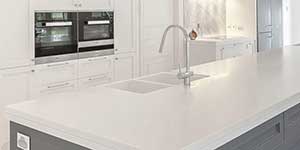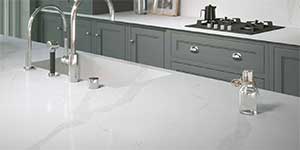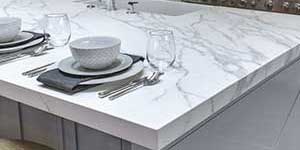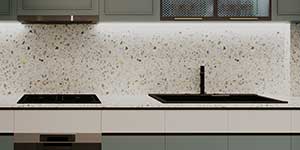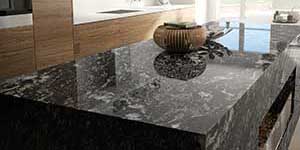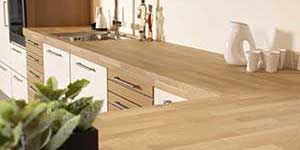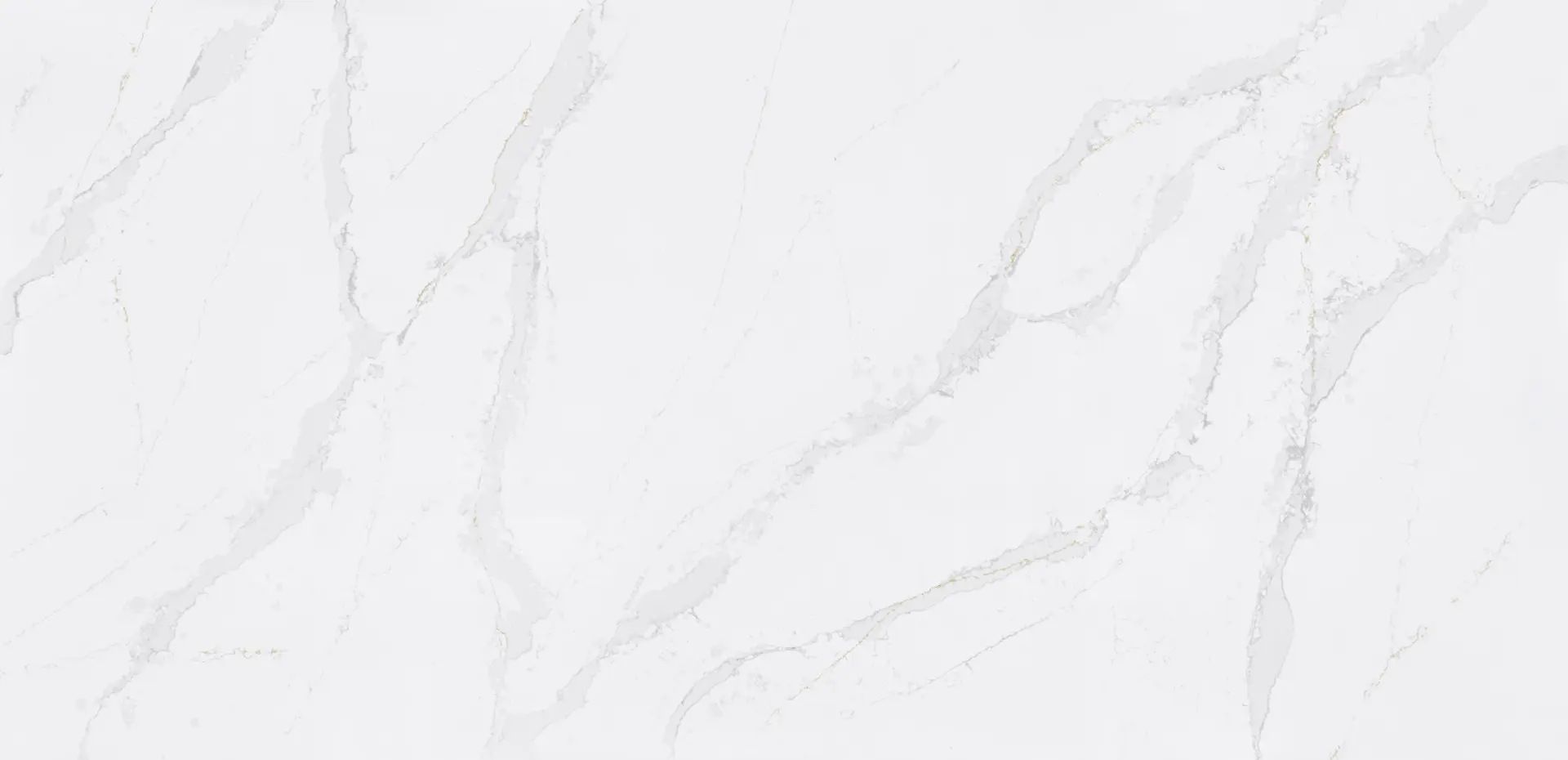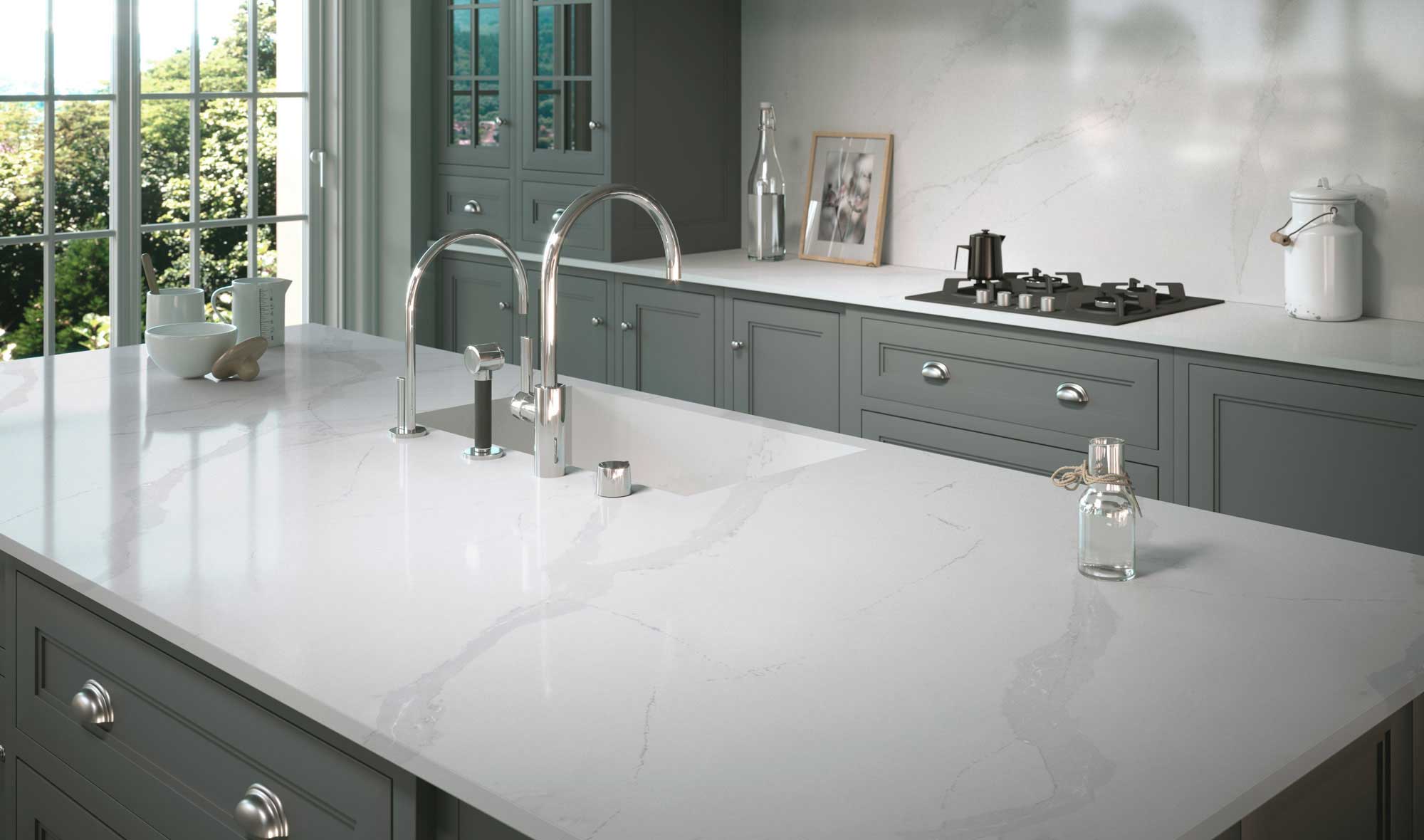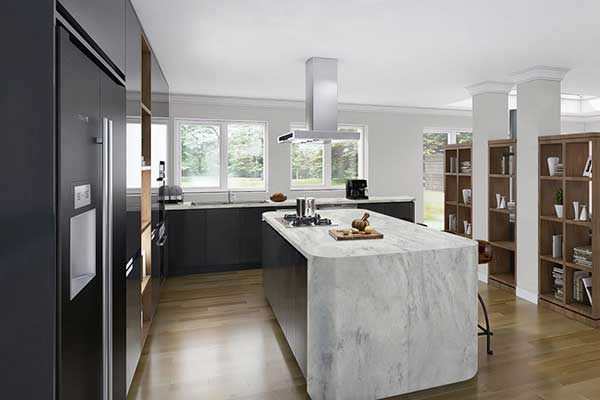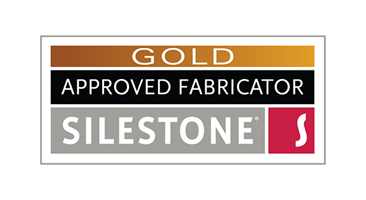Corian vs Quartz: Differences and Similarities
The main difference between Corian and Quartz is that Corian® is a registered brand name for well-known worktops made from engineered stone, known as solid surface, while Quartz is a different type of exceptionally hard engineered stone, used by several manufacturers to create worktops marketed under different brand names.
Corian and quartz are both premium-quality kitchen worktops, but they are vastly different.
And it should be noted that while the name Corian has become synonymous with solid surface worktops, the company in fact also produces quartz worktops.
What is a Corian® Solid Surface worktop?
Corian® solid surface kitchen worktops are manufactured by DuPont, and made from engineered stone, which is a blend of 66% natural bauxite minerals, 33% acrylic resins, and colour pigments. The worktop surface looks natural in appearance, but greatly improves the natural beauty and luxury of granite and marble, eliminating all the imperfections, fissures and cracks. During the manufacturing process, materials are blended and compressed into slabs of various thicknesses, colours, and textures, under high temperatures.
What is a Quartz worktop?
Quartz kitchen worktops are ultra-luxurious countertops, man-made from composite engineered stone. In a special process, 90-94% natural quartz crystals, silica, and other natural stone minerals are blended with acrylic resins, polymers, and colour pigments, and through a vibro-compaction process are compressed under high temperatures into one of the hardest materials from which kitchen worktops are made. Quartz worktop surfaces are extraordinarily hard, strong, hygienic, resilient, and heat and stain-resistant
Similarities between Corian and Quartz worktops
They are both:
- Made from engineered stone, comprising natural, but different, minerals and acrylic binding resins, mimicking the appearance of granite and marble.
- They differ from granite, marble, limestone, and slate worktops which are all made from naturally quarried stone.
- Highly attractive and ultra-luxurious, adding great value to your home.
- Highly durable and if you care for them properly, they will last for a lifetime.
- Completely non-porous, making them impervious to stains and germs, and they do not need to be sealed.
- Heat-resistant enough so you can put hot pots on them for a few seconds, but quartz worktops exceed the heat resistance of Corian. However, to prevent any damage and keep your worktops pristine, you should use a trivet and cutting boards.
- Easy to clean and they do not require special maintenance.
- Available in a vast range of colours, veins, patterns, and textures, with matching accessories and integrated sinks and basins.
- Suitable for wall cladding, shower trays, furnishings on boats, and a large number of other applications.
- Colour pigments are baked into the material and the colour is consistent throughout the thickness of the slab.
- Inherently eco-friendly and recyclable.
- Differences between Corian and Quartz
Differences between Corian and Quartz
Hardness
- Quartz is harder than Corian, making it less prone to scratches and dents.
- Corian is more flexible and can be thermoformed, shaped, curved, rounded, engraved, sanded, and routered, which is not possible with quartz.
Repairs
- Corian – Solid surface worktops are softer and easier to repair than quartz.
- Scratches in Corian can be sanded out and polished and chips can be filled in with a repair kit.
- Quartz – Only minor repairs can be done to quartz DIY by applying a special filler compound with a syringe and then polishing it down.
- More severe damage can only be repaired by professionals.
Appearance and colours
Quartz contains crystals that give the worktops a distinctive lustre, while Corian has a speckling that is similar to different types of granite or marble.
Accessories and trimmings
- Corian worktops have an even wider range of colour-coordinated accessories like integrated sinks, basins, strainers, cutting boards, backsplashes, and wall cladding.
- Because quartz is much harder than Corian, it can also be used as flooring and on staircases.
UV resistance
- Corian is more UV resistant than quartz and thus the colours will not fade when used outdoors or in direct sunlight.
Cost
Quartz is usually marginally more expensive than Corian, especially in the darker and more exotic colours.
Corian or Quartz? The verdict
Corian is more versatile and available in a larger array of colours and patterns, whereas quartz has a unique appearance, more heat and scratch resistant and more durable. So if you have specific colour schemes in mind for your kitchen, then Corian would make good sense, while anyone wishing for a more unique appearance and super durability may be better suited to quartz.
Other inspiring articles
Why Silestone Eternal Calacatta Gold is one of the UK’s best selling worktop colours
In the world of interior design, the kitchen is more than just a functional space; it's the heart of the home, a place where style meets practicality. One of the standout stars in kitchen [...]
A Solid Choice: Why Solid Surface Worktops are a Top Pick for your Kitchen
Solid surface worktops, such as Corian, Hanex, and Hi-macs, have been steadily gaining popularity in the world of kitchen design and renovation. While there's a plethora of worktop materials to choose from, solid surface [...]
Choosing the Perfect Kitchen Worktop
A comprehensive guide to Quartz, Solid Surface, Ultra Compact, Granite, and Wood When it comes to designing your dream kitchen, one of the most crucial decisions you'll make is selecting the perfect [...]
How to restore Corian countertops
Corian countertops are a popular choice for many homeowners due to their durability and low maintenance requirements. But if yours has become stained or damaged, you’ll need to know how to restore [...]

